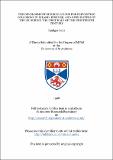Files in this item
The development of regulations for preventing collisions in inland, inshore, and open waters of the UK during the first half of the nineteenth century
Item metadata
| dc.contributor.advisor | Prescott, Robert | |
| dc.contributor.author | Bahr, Rudiger | |
| dc.coverage.spatial | 245 p. | en_US |
| dc.date.accessioned | 2018-06-14T14:58:32Z | |
| dc.date.available | 2018-06-14T14:58:32Z | |
| dc.date.issued | 1998 | |
| dc.identifier.uri | https://hdl.handle.net/10023/14084 | |
| dc.description.abstract | This work shows how the regulations to avoid collisions developed from local rules and unwritten agreements to Government law for steam-vessels within 75 years until 1850. The chaotic state of shipping on rivers and increasingly in coastal and open waters since the introduction of steam propulsion and of the shipping industry in general was evidence of several reports which also made suggestions to remedy the evil. But this was not followed by legislative measures. The advantages of steam seemed to have forbidden any regulative interference including into safety matters (surveying vessels, passenger's safety, speed, lights, &c.). Bills to put steam navigation under law failed. Local regulations were drawn up but contradicted each other. The numerous suggestions and inventions to lights and sound signals ranged from useless, impossible, or even dangerous to very effective. Only as late as 1839 the Admiralty published an order of steering regulations for H.M. steamers which were soon adopted by the Trinity House, London for the whole of the U.K., contradicting well established practice but recognised in Court. The Steam Navigation Act, 1846 contained safety issues and steering regulations and empowered the Admiralty to make regulations as to lights which came in operation in July 1848. They also approved of a set of lamps and surveying the lights was discussed. The repeal of the Navigation Laws in 1848 was accompanied by discussions on state interference into shipping matters and trade policies. "The Mercantile Marine Act, 1850." which established the Board of Trade as the central and first body entirely concerned with shipping industry and trade also established local Marine Boards as out-posts. It regulated examination proceedings as well as health issues, log-books, inquiries into accidents, &c. and marked the beginning of more legislative and regulative interference into shipping industry. Once principal disputes became more and more subject to only technical improvements. "The Merchant Shipping Act, 1854." with over 500 clauses was the final consolidation of state interference. | en_US |
| dc.language.iso | en | en_US |
| dc.publisher | University of St Andrews | |
| dc.subject.lcc | VK371.B2 | |
| dc.subject.lcsh | Navigation--Safety measures | en |
| dc.subject.lcsh | Navigation--Great Britain--19th century | en |
| dc.title | The development of regulations for preventing collisions in inland, inshore, and open waters of the UK during the first half of the nineteenth century | en_US |
| dc.type | Thesis | en_US |
| dc.type.qualificationlevel | Doctoral | en_US |
| dc.type.qualificationname | MPhil Master of Philosophy | en_US |
| dc.publisher.institution | The University of St Andrews | en_US |
| dc.publisher.department | Scottish Institute of Maritime Studies | en_US |
This item appears in the following Collection(s)
Items in the St Andrews Research Repository are protected by copyright, with all rights reserved, unless otherwise indicated.

